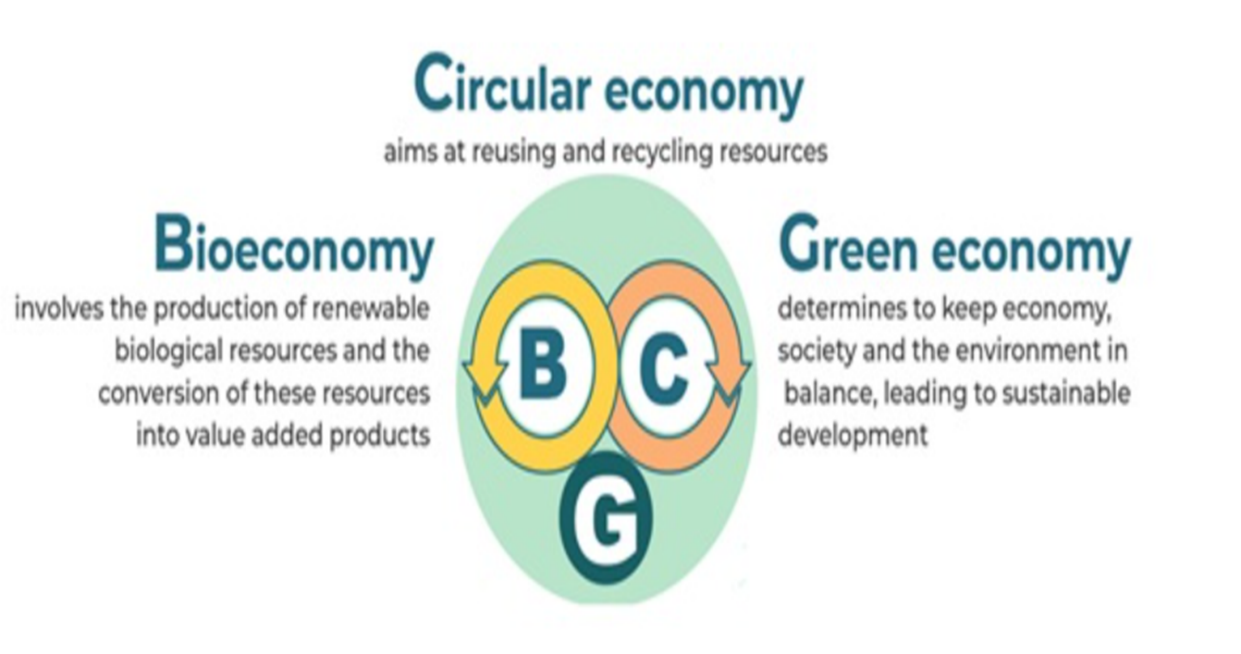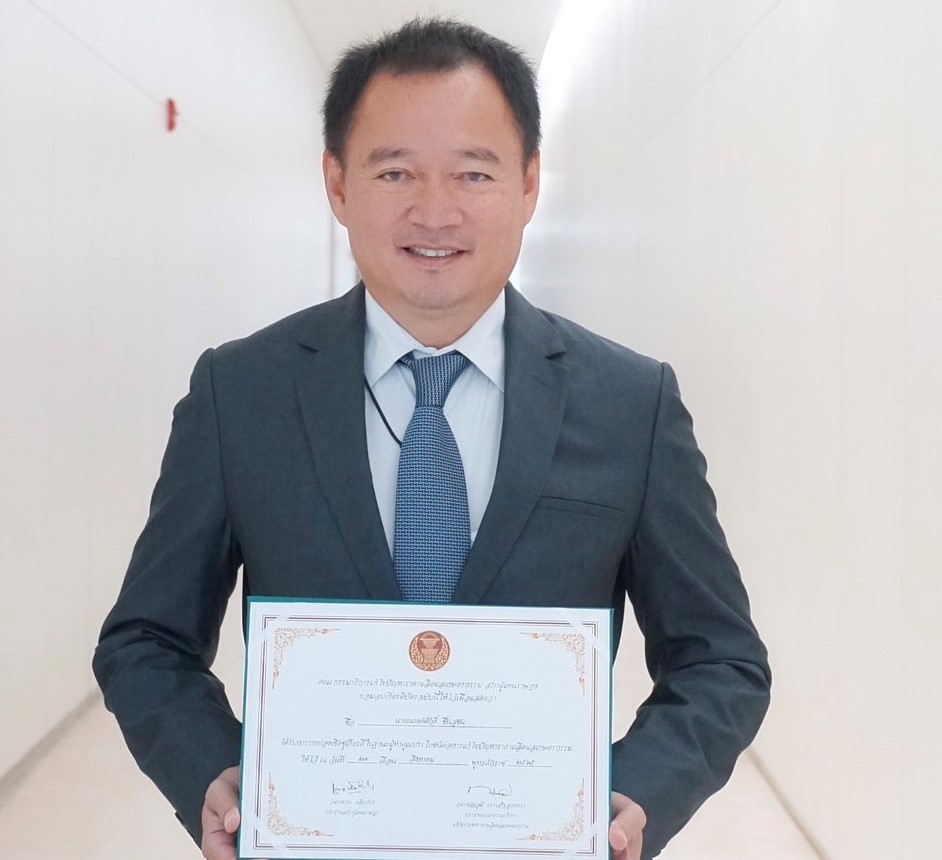FOOD and beverage manufacturers in Thailand are increasingly pursuing business growth initiatives that are aligned with the country’s Thailand 4.0 economic model. This government policy aims to address economic challenges and spur growth and social development without compromising environmental protection. Underpinned in this strategic policy is the Bio-Circular-Green Economic (BCG) model, which was tackled in the Asia-Pacific Economic Cooperation (APEC) Conference in 2022 as a new economic model for inclusive and sustainable growth.

Bio-Circular-Green Economic (BCG) Model Concept (Source: NSTDA)
The BCG comprises three key components, namely bioeconomy, circular economy and green economy:
Bioeconomy involves the creation of renewable biological resources that can then be converted into value-added and more cost-effective products using technologies. One example applies R&D on high-nutrition rice and molasses to produce fuel. Circular economy, meanwhile, capitalises on reusing and recycling resources to boost efficiency. An application is water recycling to maximise its use. Green economy creates innovation by leveraging environment-friendly technology to balance the economy, society and the environment and ensure sustainable development or minimise environmental impact. One example of this is using enzymes from microorganisms to bleach paper.
BCG conforms to the UN Sustainable Development Goals (SDGs) through the promotion of sustainable agriculture, clean energy, and responsible consumption and production, ensuring the conservation and sustainable utilisation of biodiversity and protecting the environment and ecosystem.
Thailand hopes to leverage its rich natural resources, diversity in both biological resources and physical geography, and robust agricultural activities using technology to spur the country’s growth strategy. The BCG model focuses on promoting the country’s core industry -- agriculture and food.
This sector can be developed further and its value multiplied with diverse, high-value and premium-quality products and services, better waste reduction measures, and more efficient use of resources. These can be achieved through R&D and technologies such as customer behavior analytics, optimised waste production, smart farming innovations, traceability, and food and product safety. The development of high-value and novelty food products, including food for specific niche markets such as patients and the elderly, and functional ingredients is also vital.
BCG role model: NC Coconut Co. Ltd
NC Coconut Co. Ltd, a leading Thai aromatic coconut water exporter to markets spanning Asia, the Americas, Europe, and the Middle East, is a successful Bio-Circular-Green Economic (BCG) role model. Besides serving as a BCG site, it functions as a learning centre for other enterprises and organisations looking to learn how to apply the practical BCG model in their own operations and processes.
Narongsak Chuensuchon, NC Coconut managing director, established a coconut grove and processing plant in 1996 at Damnernsaduak, Ratchaburi, which has become famous in Thailand for fine-tasting and aromatic coconut water. From a small grove, Narongsak grew the plantation to a total of 2,400 acres with a production capability of 80,000 to 1 million coconuts per day.

Narongsak Chuensuchon, managing director, NC Coconut Co. Ltd
Rising demand for coconut water and coconut flesh from global F&B producers and consumers drove NC Coconut to transform itself from a fresh coconut producer to an industrial supplier and exporter. Together with his business partners, Narongsak invested USD2.6 million to expand operations into coconut processing and export. He put a lot of effort into innovating on technologies and creating quality products.
NC Coconut to date has secured more than 20 world-class food certificates, including Global GAP, Codex GHP/HACCP, HALAL, BRC and USDA organic. The company exports to China, which accounts for 70 percent of its market, and the rest going to the US, Hong Kong, Singapore and the Middle East.
Driven by the company principle of Good Quality Good Health, it stresses premium quality and value-added products. Its aromatic coconut products boast a natural sweet flavour with minerals and nutrients. These can also be used in medicines, health tonics and beauty products.
Ready-to-eat 100% natural products are marketed under the Nai Namhom brand and comprises aromatic coconut water, coconut jelly and coconut pudding. The NC Coconut brand consistsof Coco Trimmed or coconut in a diamond shape, CoCo jelly and CoCo Neat.
Implementing the BCG
NC Coconut collaborates with universities, research facilities and government agencies for its R&D projects. The company adopts bioeconomy in its processes, utilising technologies to produce renewable resources and develop value-added and cost-effective products. It has cooperated with the Faculty of Agriculture, Natural Resources and Environment of the Naresuan University to develop aromatic coconut tissue culture. For example, the short coconut palm tree, which is native to Thailand, has a natural aromatic and sweet taste and is registered as a Geographical Indication (GI) and patent.
The Coco Bucket is another successful product designed to maintain coconut freshness for up to three months, ensuring its safety even for exporting. The sealed packaging which comes with a “coco straw” also gives consumers the experience of drinking straight from a coconut. For all these, the Coco Bucket was awarded honourable mention at the Food and Beverage Innovation Competition during the Healthy Food Products 2021 in Food ingredients Asia (FiA).
For circularity, NC Coconut looked into improving its waste recycling system and implemented a zero-waste project that involved a 9.5MW biomass power plant that recycles 30 tons to 50 tons of coconut shells per day into biomass fuel, cat litter and organic fertiliser for a most efficient use of resources.
The company’s green economy initiatives focus on providing healthy and safe products to its customers using innovative yet environment-friendly technologies to balance the economy, society and the environment toward achieving sustainable development. Narongsak encourages organic farming, utilising microorganisms to improve soil and increase productivity while ensuring the health and safety of both farmers and consumers.
NC Coconut also implemented innovation in watering the grove, which results in increased productivity, reduced time spent in watering and labor cost savings. These have led to greater income and cost efficiency and environmental sustainability. With organic coconut being a high-value and premium product in the global market, the income of Narongsak’s 100 contract farmers also grew by about 40%.

 iConnectHub
iConnectHub
 Login/Register
Login/Register Supplier Login
Supplier Login



























